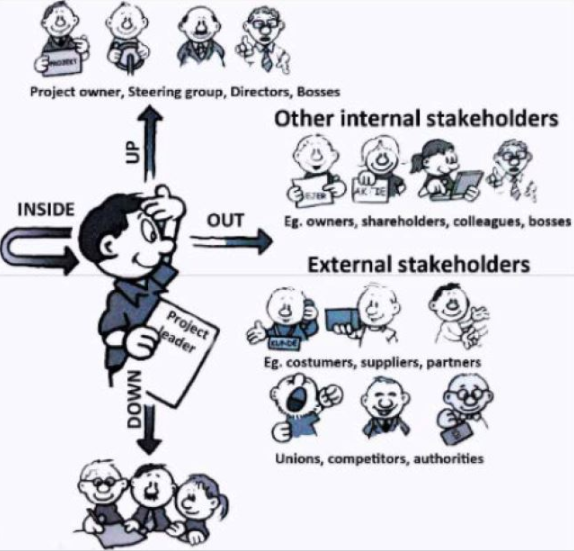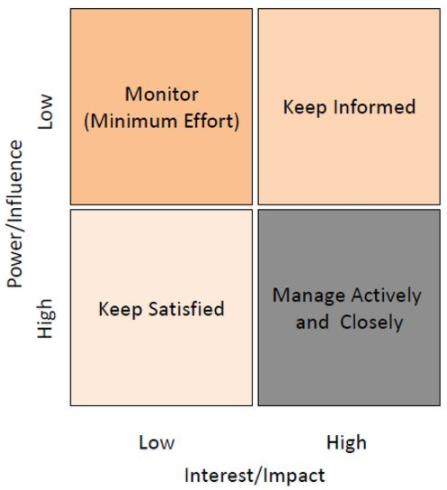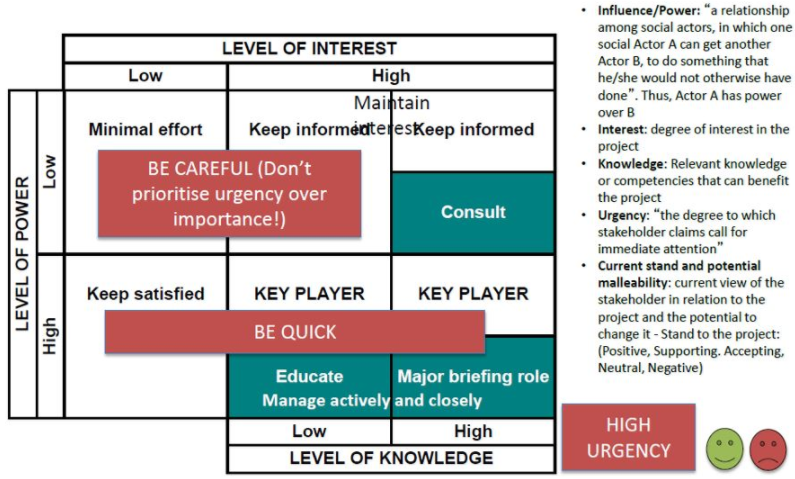Stakeholders
From DTU ProjectLab
(Difference between revisions)
(→Identification of Stakeholders) |
|||
| Line 41: | Line 41: | ||
=Identification of Stakeholders= | =Identification of Stakeholders= | ||
| − | + | [[File:Stakeholders Identification.png|frameless|center|1000px]] | |
==Simple Stakeholder Matrix== | ==Simple Stakeholder Matrix== | ||
| Line 48: | Line 48: | ||
*Use this to PRIORITIZE your effort! | *Use this to PRIORITIZE your effort! | ||
| − | + | [[File:Stakeholders Simple matrix.png|frameless|center|1000px]] | |
| + | |||
==More Comprehensive Stakeholder Assessment Tool== | ==More Comprehensive Stakeholder Assessment Tool== | ||
| − | + | [[File:Stakeholders Comprehensive matrix.png|frameless|center|1000px]] | |
Revision as of 12:57, 10 August 2017
A stakeholder is...
- Any person or organisation who can be positively or negatively impacted by, or cause an impact on the actions of a company. (Freeman, 1984)
- “Person or organization (e.g., customer, sponsor, performing organization, or the public) that is actively involved in the project, or whose interests may be positively or negatively affected by execution or completion of the project. A stakeholder may also exert influence over the project and its deliverables.” (PMBok)
- A person, group or organization that has interests in, or can affect, be affected by, or perceive itself to be affected by, any aspect of the project. (ISO 21500)
Examples of stakeholders:
- Project / Program / Portfolio Sponsor—The individual executive (or group of executives) who champions the initiative and is responsible for providing resources and is ultimately responsible for delivering the benefits.
- Project / Program / Portfolio Governance Board—The group responsible for ensuring that goals are achieved and providing support for addressing risks and issues across the organization.
- Project / Program / Portfolio Manager—The individual responsible for managing the Project / Program / Portfolio .
- Project / Program / Portfolio Team Members—The individuals performing *Project / Program / Portfolio activities.
- Funding Organization—The part of the organization or the external organization providing funding.
- Performing Organization—The group that is performing the work through component projects and non-project work.
- Project / Program / Portfolio Management Office—The organization responsible for defining and managing the governance processes, procedures, templates, etc., supporting individual teams by handling administrative functions centrally, or providing dedicated assistance to the manager.
- Customers—The individual or organization that will use the new capabilities/ results and derive the anticipated benefits. The customer isa major stakeholder in the final result and will influence whether the Project / Program / Portfolio is judged to be successfulor not.
- Potential Customers—The past and future customers who will be watching intently to see how well the Project / Program / Portfolio delivers the stated benefits.
- Suppliers—Product and service providers are suppliers who are often affected by changing policies and procedures.
- Governmental Regulatory Agencies—Organizations should operate within the regulatory and legal boundaries of their local and national sovereign governments, aswell as other related nongovernmental organizations that set standards or requirements that are required to be adhered to.
- Competitors—Some competitors are affected by the program team's ability to deliver benefits as chartered. A competitor may rely on the benefits of the performing organization's Project / Program / Portfolio as a component of one of their Project / Program / Portfolioand, in those cases, would be interested in the success of the Project / Program / Portfolio . Competitors may also benchmark their success in comparison to the performing organization's success. Impacted competitors may be managed as stakeholders.
- Affected Individuals or Organizations—Those who perceive that they will either benefit from or be disadvantaged by the Project / Program / Portfolio’s activities.
- Other Groups—Groups representing consumer, environmental, or other interests (including political interests).
Contents |
Stakeholder Process
Generic process
- Identification of stakeholders
- Assessment of stakeholder
- Engaging the stakeholders
The stakeholder analysis process
- Identify all stakeholders(brainstorm)
- Identify their needs & interests
- Classify groups of interests (Stakeholder mapping)
- Identify areas of conflict
- Prioritize, reconcile and balance stakeholders
- Align significant stakeholder needs with organization’s strategies and actions
Identification of Stakeholders
Simple Stakeholder Matrix
- Identifying stakeholders and categorizing them in a matrix according to their influence, power and interest in the project.
- Use this to PRIORITIZE your effort!


